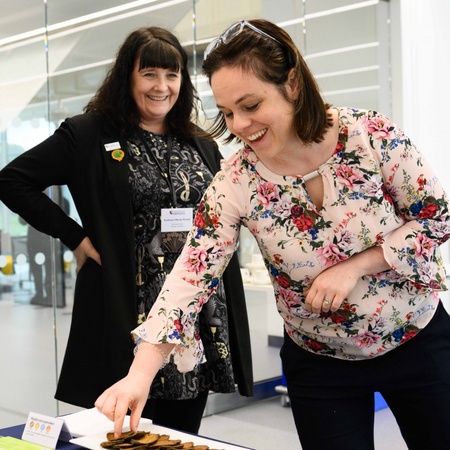Scotland's Deputy First Minister has had a taste of the future with hemp-based pancakes.
Work at the University of Aberdeen’s Rowett Institute has demonstrated that hemp is an affordable nutritious food with the potential to help Scotland meet its health, climate and nature targets. It is superior to rapeseed and olive oil, lends itself to many recipes and could help with carbon capture.
In all, Kate Forbes MSP learnt of four ground-breaking research initiatives by scientists seeking solutions to some of society’s biggest challenges when she visited the University yesterday (Monday).
Principal and Vice-Chancellor George Boyne and Vice-Principal Regional Engagement Professor Peter Edwards, highlighted to the Cabinet Secretary for Economy and Gaelic, the potential for each research initiative to boost the regional and national economy.
The Deputy First Minister said: “Driving innovation is key to helping unlock each of the Scottish Government’s priorities of eradicating child poverty, boosting economic growth, achieving net zero and improving public services.
“Our universities play a vital role in fostering and nurturing the ideas and enterprise at the heart of a thriving economy, and I was delighted to visit the University of Aberdeen to see first-hand the research projects and discuss the important work being undertaken to drive real economic, social and environmental impact across the north east and beyond.”
Professor Boyne said: “We were delighted to welcome the Deputy First Minister onto campus and share just some of the wide-ranging and innovative research that’s tackling the big challenges of our time.”
Professor Edwards added: “The University is committed to supporting the regional and national economy by transforming research, ideas, and intellectual property into products or services – either by working in partnership with existing companies or through the creation of new University spinouts.”
The four research initiatives
Hemp
Professor Wendy Russell and Dr Madalina Neacsu explainedhow Rowett Institute research has underpinned a Scottish hemp sector resurgence by demonstrating the health and environmental benefits of the crop. The team were pivotal in hemp being grown for food for the first time in Scotland and in the production of the first commercial hemp oil.
Now the team is working with hemp growers and processors, including key players in the bakery sector, to provide healthier, affordable and tasty staple foods. They are also working to improve the nutritional quality and carbon profile of livestock produce, as well as developing an alternative to peat and coir for Scotland’s soft fruit and vertical farming industries.
Data & AI
Professor Georgios Leontidis and Postgraduate Researcher Matthew Beddows explained how they are working with partners, growers, breweries and other stakeholders to develop new technologies based on AI that can support the agri-food sector achieve net zero.
The UK has a legally binding target of net zero greenhouse gas emissions for 2050 or 2045 in Scotland. Food and Drink is the UK’s largest manufacturing sector with the global food system producing 30% of global emissions (CO2e).
Focusing on strawberry production, the team has partnered with a major UK producer to develop and evaluate AI systems that optimise yield and carbon footprint. The research includes deploying sensors across polytunnels to collect data on temperature, humidity, light exposure, soil conditions and water and fertiliser use.
This is combined with yield reports and weather forecasts to train AI models. The aim is to provide insights for policymakers, agronomists and farm managers, supporting sustainable agricultural practices without compromising productivity.
Green hydrogen
PhD researcher in electrochemistry and founder of Hycor – a green-tech spin out company - Jani Shibuya, discussed how the company is utilising seawater as it facilitates the exciting breakthrough of large-scale hydrogen production.
Scotland’s 2045 net-zero targets include 25 gigawatts of hydrogen production, which would equate to the use of 13% of Scotland’s fresh water. This unsustainable volume could limit Scotland's rapidly growing green hydrogen sector. Alternatives such as seawater are required but desalination is energy intensive and produces a polluting brine at scale.
Hychor’s technology produces hydrogen through a new type of electrolyser system which can input seawater instead of freshwater. The technology increases overall efficiency, reduces costs, builds in system resilience, and minimises environmental impact.
Fungal infections
Professor Carol Munro, co-founder and CSO of pre-spinout company Brigid Biologics and Steven McPherson, Postgraduate Researcher, School of Medicine, Medical Sciences and Nutrition described their novel antibody therapeutics to combat serious fungal infections.
Globally over 3.2 million people die each year due to invasive fungal infections. Therefore, there is a clear and urgent clinical need for better antifungal therapies.
The team have developed novel, fully human antibodies that recognise specific surface components of deadly fungal pathogens. Antibodies form part of the body’s natural defences against infections and so we are providing a way to bolster the patients’ own defences. The pre-clinical development of these antibodies is the focus of the research group with the goal to spin out a company Brigid Biologics from the University of Aberdeen.


